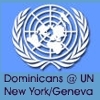

| BRIEFING - July 10, 2013 | To learn more about the Millenium Development Goals, click on the graphic NEW! Read the summer issue of the Dominicans at the UN newsletter Past Briefings: June 26, 2013 June 12, 2013 May 8, 2013 April 24, 2013 February 27, 2013 February 13, 2013 January 30, 2013 December 19, 2012 December 5, 2012 |
|
RIO + 20 one year later… Part II In my last Briefing, I introduced the notion of Sustainable Development Goals (SDGs) and the Post-2015 Development Agenda, both of which flow from the outcome of Rio + 20. This Post-2015 Development Agenda is intended to be people-centered, while acknowledging the fact that we live on a fragile planet whose limited resource base is already being stretched to the limit. One year ago, in the aftermath of Rio + 20, UN Secretary General Ban Ki-moon appointed a high level panel to prepare a framework for this development agenda. The 27-member panel was chaired by UK Prime Minister David Cameron and Liberian President Ellen Johnson Sirleif, among others. The panel’s report was released in June with mixed reviews. Its goal is to eradicate extreme poverty by 2030, and fulfill the promises made to foster sustainable development. The report identifies five “transformational shifts” that are needed to make this dream a reality:
While the report has been welcomed for its affirmation of the importance of moving forward with an integrated approach to development, there are significant weaknesses. Climate change is “mentioned,” but not given the weight it merits given the warming of the Planet and the consequent severe weather events globally. Human rights are “mentioned,” but development through a human rights-based approach is ignored. Finance is “mentioned,” but there is no indication of how this post-2015 development agenda will be financed—nor any indication as to who would bear the greater responsibility in this regard. And perhaps most disturbing of all is the weakness in addressing corporate accountability. If business is not held to rigorous standards, the fear is that “profit” will trump the needs of people and planet. Nonetheless, the president of the General Assembly, Vuk Jeremic, expressed hope that the panel’s report will serve as a wake-up call, “for we are not doing enough to meet the fundamental challenges of our time: to end extreme poverty in this generation and significantly narrow the global gap between rich and poor, without inflicting irreparable damage to the environment… I am truly convinced that we must act to slow the alarming pace of climate change, which poses an unprecedented threat to humanity.” The following wisdom, articulated 20 years ago in the Rio Principles at the 1992 Earth Summit in Rio de Janeiro, seems timeless in its message:
For more information: Watch this five-minute video on the Post-2015 Development Agenda.
|
Dominican Leadership Conference
Building relationships and collaborating in the mission of preaching the Gospel
29000 West Eleven Mile Road
Farmington Hills MI 48336
248-536-3234 Contact: Executive Director

